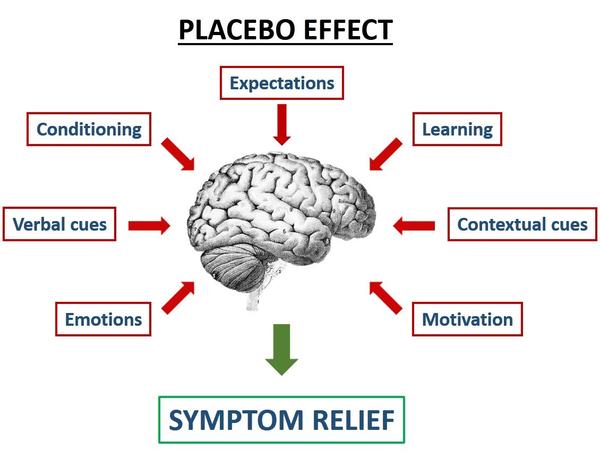The placebo and nocebo effects are prevalent psychological phenomena. Conditioning and social learning seem to play an integral role in the positive or negative outcomes associated with this phenomenon. The placebo effect has been reported to have an analgesic and performance enhancing effect in the literature, while the opposite has been reported for the nocebo effect. In this blog, three papers will be presented discussing the role these play regarding sports performance.
In a paper published in 1972, highly experienced lifters were told that they would be taking anabolic steroids (Ariel, 1972). Researchers used convincing wording to help reinforce the beliefs about the effectiveness of the anabolic steroids. For example, subjects were told they were receiving this drug and that it would have positive effects on performance. To start the study, baseline levels of strength were collected for the lifts of interest. When recollected a few weeks later, a significant increase in performance was measured from the pre-placebo period to the placebo period in all but one of the lifts of interest (Ariel, 1972). An increase in performance was reported when subjects believed they were given anabolic steroids compared to those who were not convinced they were given them. This suggests that the athlete’s expectations of increase in performance were previously high. This is an interesting finding because these were trained lifters. In the resistance training literature, a novelty effect, or a rapid increase in performance in untrained subjects, can skew data since they will adapt to a new stimulus. This was not the case in this study due to the past training experience of the subjects involved. This finding lead to understanding that belief in a certain protocol, can highly influence results.
In a paper published in 2000, researchers used deceptive administration of anabolic steroids in 11 national level powerlifters to measure the placebo effect (Maganaris, 2000). Deception was used to invoke the placebo effect, however halfway through the study deception was administered to one of the groups to see if performance returned to baseline. Both groups, prior to deception, increased squat, bench, and deadlift compared to baseline trials (Maganaris, 2000). Interestingly, the deception group saw a drop off in performance once deception was revealed while the placebo group was able to maintain their performance (Maganaris, 2000). The authors of this study reported that athlete’s expectancy was driven by the athletes previous understanding of the effects of anabolic steroids (Maganaris, 2000). Due to the belief in steroids performance enhancing nature, outcomes returned to baseline once deceived because subjects knew they were no longer receiving this stimulus.
To further investigate the relationship between performance and the placebo and nocebo effect, in 2007 a study was conducted to investigate the difference between positive expectations and negative expectations when using ergogenic aids (Beedie, 2007). The experimenters split teams into two groups and influenced them with either high expectations or low expectations regarding ergogenic aids. A 30-meter sprint protocol was implemented in 2 conditions: baseline and experimental. Researchers informed participants that they would be receiving a new ergogenic supplement. Depending on the condition, athletes were either told that the drug would have performance enhancing benefit or performance degrading effects. Three 30 m sprints, with two minutes rest, were then implemented testing the athlete’s performance. Mean speed increased from baseline in the positive expectations group but not the negative expectations group (Beedie, 2007). The negative expectation group were reported to have run slower (Beedie, 2007). From these results, researchers concluded that beliefs about substance effectiveness and administration can impact performance either positively or negatively.
Due to the understanding of perception and the placebo effect, discrepancy in whether it is ethical to purposefully induce this effect in healthcare has become an interesting topic. This literature exemplifies the untapped psychological potential of the subjects regarding performance. With the increase in the popularity of the fitness industry, understanding of the placebo effect, and the realization that marketing is a big part of success in this industry, it is interesting to consider, and further investigate, the effectiveness of certain ergogenic aids and fitness/recovery remedies. Due to the understanding that expectations can affect performance positively and/or negatively, it is important to understand how to effectively communicate with athletes in a truthful, but not deceiving or debilitating manner.
In conclusion, these studies demonstrate that the subject’s perception, previous understanding, learning and communication can contribute either positively or negatively to outcomes. It is important to understand the ethical use of a placebo for health care. As professionals, trust needs to be developed to ensure a strong relationship, but it is wrong to manipulate, deceive, and catastrophize situations as they may lead to negative outcomes. Although there seems to be a relationship between learning, conditioning, and perception in influencing the placebo effect, its mechanism is still not well understood and needs further investigation.
References
Ariel G, Saville W. Anabolic steroids: the physiological effects of placebos. Med Sci Sports
Exerc 1972; 4: 124–6
Maganaris CN, Collins D, Sharp M. Expectancy effects and strength training: Do steroids make
a difference? Sport Psychologist 2000; 14 (Pt 3): 272–8.
Beedie CJ, Coleman DA, Foad AJ. Positive and negative placebo effects resulting from the
deceptive administration of an ergogenic aid. Int J Sport Nutr Exerc Metab 2007; 17:
259–69





